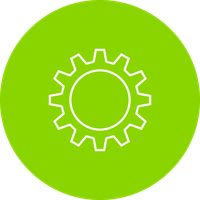
ITEA Impact story
I²PANEMA

Smart IoT solutions for future-proof ports



Impact highlights
- Within I²PANEMA, German SME NautilusLog led efforts to develop ISO 4891, a new global standard for smart applications for ships, reducing paperwork, improving compliance and enhancing data transparency. The project results directly led to a growth from five to more than 25 international employees.
- I²PANEMA contributed to the expansion of Prodevelop's Posidonia Port Solution Suite. Since the project's completion in December 2022, Prodevelop has experienced a 70% revenue growth and a 25% increase in its workforce.
- IoT-driven ferry transport optimisation in Hamburg improved arrival time predictions to within 15 seconds, enhancing passenger experience and operational efficiency.
- In the Assan port in Türkiye, sensor-based container localisation has increased the number of operations in one shift by >10%, decreased completion time for one movement by >15% and reduced accidents by >50%. This has increased profitability for the port as 10% more container movements can be made.
- AI-powered pollution monitoring in Gijón led to a 100% reduction in response time for environmental alerts, helping ports adapt to sustainability challenges in real time.
- The innovative Active Noise Control (ANC) technology developed by Fraunhofer and TriCon, reduced port noise levels by 15 decibels and received the 2021 CNA ‘Intelligence for Transport & Logistics' Innovation Award.
Ports serve as crucial hubs in international supply chains, yet they face significant challenges such as congestion, urbanisation, and environmental concerns. With an increasing focus on sustainability and digital transformation, there was an urgent need for smarter operations.
The I²PANEMA project, gathering 17 partners from Germany, Spain and Türkiye, stepped in to address these challenges by integrating smart Internet of Things (IoT) solutions into port operations. The consortium brought together port authorities, technology providers, and research institutions to ensure that real-world challenges were met with practical innovations.
I²PANEMA aimed to use IoT technology to create a connected, efficient port ecosystem. The common idea was to optimise media discontinuities in radio, IT and paper processes to enable greater efficiency of port operations. By integrating sensor networks, machine learning, and real-time data processing, the project delivered transformative solutions across multiple use-cases.
Project results
At the heart of I2PANEMA’s success is its three-layer architecture:
- Machine-to-Machine Communication Layer (MCL): Collects data from sensors and devices across the port.
- IoT Interoperability Layer (IIL): Ensures seamless communication between different systems, standardising data exchange.
- Data Management Layer (DML): Uses machine learning to analyse data, extract insights, and support decision-making.
One of the key innovations was the development of ISO 4891, a new international standard for smart applications. Within I²PANEMA, German partner NautilusLog led efforts to develop this standard, helping to eliminate data silos and enabling a seamless, real-time data flow. It is designed to establish a framework for the interoperability of smart applications onboard ships and marine technology systems.
Furthernore, I²PANEMA has demonstrated that ferry arrival times in Hamburg, Germany, can be accurately predicted to within 15 seconds, which has resulted in a 100% reduction in average processing time for stop announcements.
I²PANEMA's impact also extended beyond logistics. To address noise pollution, the project developed Active Noise Control (ANC) technology, which reduces port noise by 15 decibels, enabling extended operations without disturbing surrounding communities. This innovation earned the CNA Innovation Award and is now being explored for inland ports and railway applications.
Exploitation
Next to these impressive innovations and standardisation results, I²PANEMA has led to concrete business impact.
By completely digitalising logbooks for the first time, NautilusLog offers savings on both time and paper and have attracted the attention of many ship owners and has led to strong company growth. Today, NautilusLog serves more than 130 shipping lines, as well as the German Federal Ministry of Transport and esteemed maritime brands such as MSC, Oldendorff, SGS, and Bernhard Schulte Management.
Driven in part by the efforts of I²PANEMA, Spanish SME Prodevelop has extended their Posidonia Port Solution Suite with seamless sensor integration, cloud edge computation and AI analytics, allowing them to strongly increase both revenue and staff.
Within the I²PANEMA project, Turkish partner VTEK developed a container localisation use case. Although currently manual position verification is still needed, new-generation GPS modules now incorporate advanced algorithms for improved accuracy, which could significantly enhance the reliability of container localisation. Once these modules reach the necessary level of precision, VTEK is ready to scale the solution immediately in a plug-and-play manner.
The impact of I²PANEMA continues to expand through follow-up initiatives like the ITEA project Optimal-LOADS, which builds on its innovations to enhance digital logistics solutions. With its pioneering work in port digitalisation, I²PANEMA has demonstrated the power of digital transformation in ports and strengthened the international maritime network.
More information
Download I²PANEMA Impact storyRelated projects
I2PANEMAOrganisations
Bayernhafen (Germany)Fraunhofer (Germany)
Gijón Port Authority (Spain)
Hamburg Port Authority AöR (Germany)
Materna Information & Communications SE (Germa…
NautilusLog GmbH (Germany)
Prodevelop (Spain)
VTEK Bilişim Teknolojileri A.Ş. (Türkiye)

